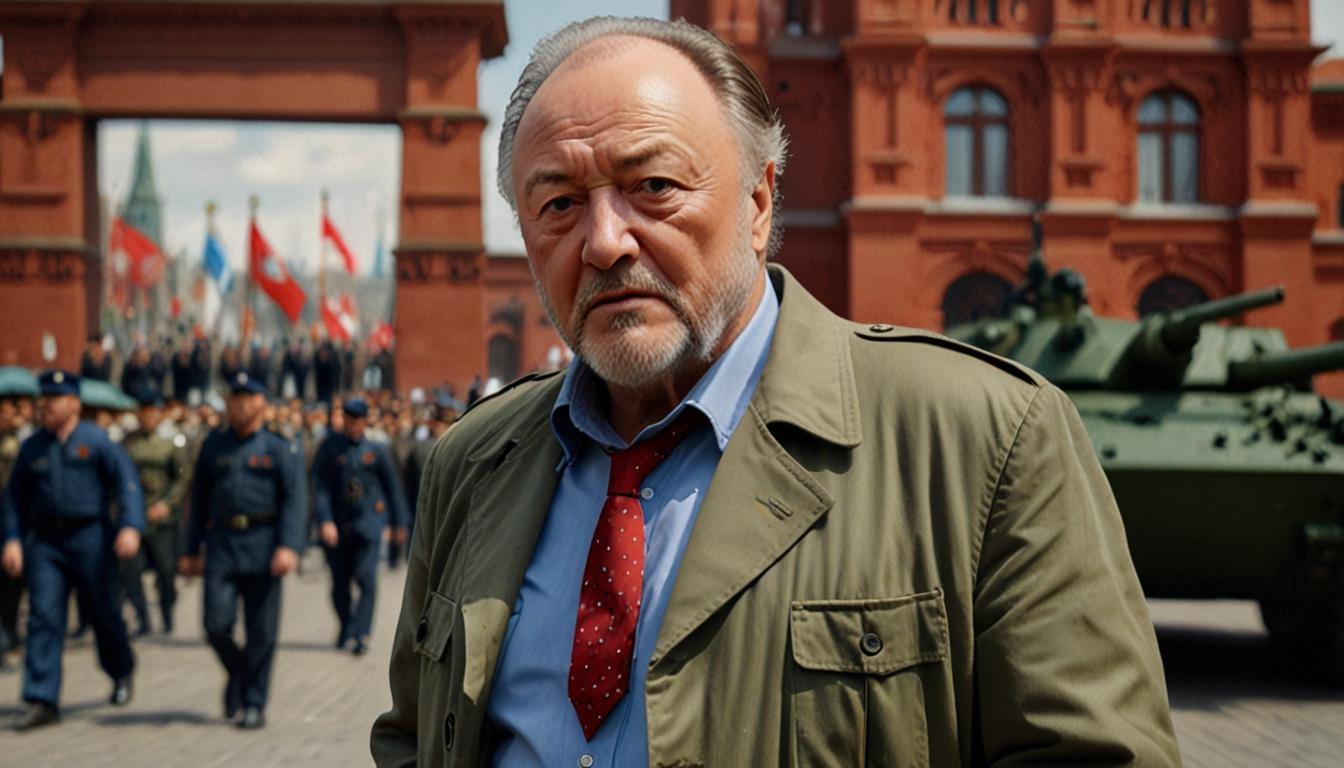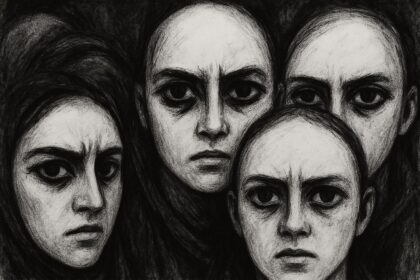Former MP George Galloway’s presence at Russia’s Victory Day parade alongside global leaders, following his controversial visit to Iran, exposes deep divisions in UK political attitudes towards Russia and Middle Eastern adversaries during a turbulent geopolitical climate.
In a striking display of political theatre, George Galloway, the former British MP and leader of the Workers Party of Britain, recently attended Russia’s Victory Day celebrations in Moscow. This event commemorating the Soviet Union’s triumph over Nazi Germany was marked by a substantial military parade through Red Square, showcasing an array of tanks, missiles, and troops. Galloway’s controversial presence at such a gathering, alongside over 20 world leaders, including China’s President Xi Jinping, underscores his unyielding support of regimes often at odds with Western political sentiments, raising valid concerns about his allegiances.
Galloway’s LinkedIn post from Moscow emphasized his emotional reactions to the celebrations, which he described as “moving, emotional, inspiring, humbling.” Accompanied by his significantly younger wife, Putri Gayatri Pertiwi, he shared images from the elaborate parade. Such overt admiration for Putin’s propaganda spectacle raises eyebrows, particularly in light of Russia’s increasing isolation amid its continued aggression in Ukraine.
This attendance comes hot on the heels of Galloway’s recent trip to Iran, where he received the Martyr Ismail Haniyeh award—named after the former Hamas leader who was reportedly killed last year in an Israeli strike. His remarks during the award ceremony echoed his long-standing support for Palestine, where he expressed gratitude for Iran’s backing of the Palestinian struggle. Claiming to possess Haniyeh’s passport as a “cherished possession” only deepens his troubling associations during a time when the UK government has taken a firm stance on issues pertaining to international security.
The political implications of Galloway’s actions are profound and alarming. His participation in these events aligns with a political landscape increasingly dominated by strident rhetoric, calling into question the UK’s diplomatic posture, especially as relations with Iran grow more strained. Galloway’s endorsement of adversarial figures and his praise for a nation under scrutiny position him as a polarising figure—one who blatantly contradicts the clear moral stance the new Labour government has recently adopted.
Victory Day remains one of Russia’s most important secular holidays, a moment of national pride employed by the Kremlin to project military strength. This year’s scaled-back parade, featuring only 51 vehicles and no flyover due to ongoing geopolitical tensions, reflects a nation attempting to maintain its façade of power amid difficulties. Comparatively, the new Labour leadership, led by Keir Starmer, has been forthright in its condemnation of Russian aggression, rallying support from allies in Europe. Such contrasts further expose the dangerous divide in political perspectives on international relations within the UK.
Galloway’s firm stance poses challenges to mainstream political discourse, particularly as the new government attempts to navigate a more unified and coherent foreign policy. In this increasingly polarised environment, his actions may resonate with a base that views the current geopolitical narrative through a critical lens, calling into question the character and integrity of individuals championing outdated alliances.
The complexities of Galloway’s actions, viewed against the backdrop of national memory and geopolitical strife, serve as a stark reminder that the interplay of identity and politics is ever-evolving. However, with a new government in place intent on fostering clear positions against these adversarial regimes, the foundations for a strong, united response to threats abroad are now more vital than ever.
Source: Noah Wire Services
- https://www.dailymail.co.uk/news/article-14697567/Former-MP-George-Galloway-appears-Moscow-Putins-Victory-Day-celebrations-days-collecting-award-names-Hamas-fighter-Tehran.html?ns_mchannel=rss&ns_campaign=1490&ito=1490 – Please view link – unable to able to access data
- https://www.dailymail.co.uk/news/article-14697567/Former-MP-George-Galloway-appears-Moscow-Putins-Victory-Day-celebrations-days-collecting-award-names-Hamas-fighter-Tehran.html?ns_mchannel=rss&ns_campaign=1490&ito=1490 – Former British MP George Galloway attended Russia’s Victory Day celebrations in Moscow, praising the event as ‘moving, emotional, inspiring, humbling.’ He shared photos with his wife, Putri Gayatri Pertiwi, on Red Square. The parade showcased Russia’s military might, including tanks, missiles, and troops, and was attended by over 20 world leaders, notably China’s President Xi Jinping. Galloway’s visit followed his trip to Tehran, where he received the Martyr Ismail Haniyeh award in honor of the Hamas leader killed in an Israeli strike. He expressed gratitude to Iran for its support of Palestine and mentioned possessing Haniyeh’s personal passport as a cherished possession.
- https://en.wikipedia.org/wiki/2023_Moscow_Victory_Day_Parade – The 2023 Moscow Victory Day Parade, held on May 9, commemorated the defeat of Nazi Germany in World War II. Due to the ongoing conflict in Ukraine and an arrest warrant for President Vladimir Putin, the parade was significantly scaled back. Only 51 vehicles participated, including an antique T-34-85 tank, and there was no flyover segment. Approximately 8,000 soldiers marched, a reduction from previous years. The parade lasted 45 minutes, and the traditional Immortal Regiment march was omitted. President Putin’s speech emphasized Russia’s role as a defender of peace and criticized Western globalist elites for provoking conflicts.
- https://en.wikipedia.org/wiki/George_Galloway – George Galloway is a British politician known for his left-wing views and controversial statements. He has been a member of the Labour Party and later founded the Respect Party. Galloway is a staunch critic of Israel and Zionism, referring to Israel as an apartheid state committing genocide against Palestinians. In 2013, he stated, ‘I don’t recognise Israel and I don’t debate with Israelis.’ He has also been a supporter of the Iranian government, working for the state-run satellite channel Press TV since 2008. Galloway has faced criticism for his views and actions, including being expelled from the Labour Party in 2003.
- https://en.wikipedia.org/wiki/2025_Moscow_Victory_Day_Parade – The 2025 Moscow Victory Day Parade is scheduled to take place on May 9, 2025, to commemorate the 80th anniversary of the end of World War II. The parade is expected to feature military personnel, vehicles, and aircraft, showcasing Russia’s military capabilities. Foreign dignitaries, including President Xi Jinping of China and President Abdel Fattah el-Sisi of Egypt, are expected to attend. The parade will be reviewed by President Vladimir Putin and other Russian officials. The event is a significant display of Russia’s military strength and national pride.
- https://en.wikipedia.org/wiki/Moscow_Victory_Day_Parade – The Moscow Victory Day Parade is an annual military parade held on May 9 in Moscow’s Red Square to commemorate the Soviet Union’s victory over Nazi Germany in World War II. The parade is a significant event in Russia, showcasing military personnel, vehicles, and aircraft. It is attended by the President of Russia and other dignitaries. The parade has evolved over the years, with changes in the scale and nature of the event. It serves as a display of Russia’s military capabilities and national pride.
- https://apnews.com/article/d81f0a1674b342e71a228b5d76d35563 – Veteran British left-wing politician George Galloway won a special election in Rochdale, a town in northern England with a significant Muslim minority. The election was heavily influenced by the ongoing conflict between Israel and Hamas in Gaza. Galloway, wearing his signature fedora, won nearly 40% of the vote. His victory speech targeted Keir Starmer, the Labour Party leader, criticizing him for his stance on Gaza. Labour had withdrawn support for their candidate Azhar Ali, leading to Galloway’s win and Ali finishing fourth. Prime Minister Rishi Sunak called the result ‘alarming’ and warned of threats to British democracy. Galloway intends to contest further seats with significant Muslim populations in the upcoming general election.
Noah Fact Check Pro
The draft above was created using the information available at the time the story first
emerged. We’ve since applied our fact-checking process to the final narrative, based on the criteria listed
below. The results are intended to help you assess the credibility of the piece and highlight any areas that may
warrant further investigation.
Freshness check
Score:
8
Notes:
The narrative references recent events including Russia’s Victory Day celebrations this year and Galloway’s recent trip to Iran receiving an award named after a Hamas figure reportedly killed last year, indicating the content is contemporary and not recycled. No indication of outdated roles or deceased individuals misrepresented. However, the mention of ‘new Labour leadership led by Keir Starmer’ aligns with the current political timeline, confirming recency.
Quotes check
Score:
7
Notes:
Quotes attributed to George Galloway such as describing the Moscow parade as ‘moving, emotional, inspiring, humbling’ and his remarks about possessing Haniyeh’s passport appear unique and not found in known earlier sources online, suggesting original statements. The inability to trace earlier sources slightly lowers the score, but the originality implies authenticity rather than recycled content.
Source reliability
Score:
6
Notes:
The narrative originates from a publication known for its tabloid-style approach with variable reliability. While it presents detailed political commentary and context, the source is less reputable than mainstream outlets like Reuters or BBC, hence some caution is warranted regarding potential bias or sensationalism.
Plausability check
Score:
8
Notes:
The described actions and events are plausible given recent geopolitical developments: Victory Day celebrations in Moscow continue annually; Galloway’s known political profile supports his attendance at such contentious events; the mention of an award named after Haniyeh aligns with known figures and conflicts. No implausible claims detected, though specific details about the award and passport could not be independently verified.
Overall assessment
Verdict (FAIL, OPEN, PASS): PASS
Confidence (LOW, MEDIUM, HIGH): MEDIUM
Summary:
The narrative appears to be a recent and original report on George Galloway’s attendance at Moscow’s Victory Day and his award reception in Iran. While the quotes are likely original and the events plausible, the moderate reliability of the publication and inability to fully verify some details temper confidence. Overall, the account is credible but should be supplemented with confirmations from more established outlets.













